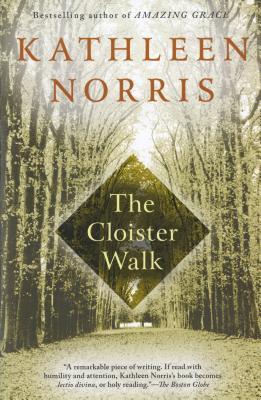Summary from the back cover
Why would a married woman with a thoroughly Protestant background and often more doubt than faith be drawn to the ancient practice of monasticism, to a community of celibate men whose days are centered around a rigid schedule of prayer, work, and scripture? This is the question that poet Kathleen Norris asks us as, somewhat to her own surprise, she found herself on two extended residencies at St. John's Abbey in Minnesota. Part record of her time among the Benedictines, part meditation on various aspects of monastic life, The Cloister Walk demonstrates from the rare perspective of someone who is both an insider and outsider, how immersion in the cloistered world -- its liturgy, its ritual, its sense of community -- can impart meaning to everyday events and deepen our secular lives. In this stirring and lyrical work, the monastery, often considered archaic or otherworldly, becomes immediate, accessible, and relevant to us, no matter what our faith may be.
My rating
My review
I'm not sure quite what I expected when I picked up this book at the library, but it completely blew. me. away.
The Cloister Walk is almost a journal of sorts, with plenty of stream-of-consciousness and slice-of-life writing, but much more poetic than that. I don't like choppy books--those that read like a diary or are compiled of essays--but this was the most beautiful book I have ever read. It almost defies explanation (if you couldn't tell by the above nonsensical paragraph).
The chapters are organized in chronological fashion, beginning with "Dawn" and ending with "Night," sandwiching Christmas, Easter, and several saints' days in-between. These are all interspersed with reflections on everything from celibacy to habits (clothing). Some chapters are only two pages long, a brief jotting down of thoughts, while others are lengthy essays. I skipped only one that seemed unusually long-winded and boring; it was the exception to the rule.
Perhaps the reason I connected so well with this book is that Kathleen Norris is a poet, and she seems to see the world through the same distorted lens that I do (which is very rare indeed). It was so beautiful that I wanted to savor it, a feeling I've never had about a book before. I usually read ravenously, hungry for more. A Cloister Walk caused me to meditate and digest each chapter slowly, satisfied from beginning to end.
I recommend this book for
poets, writers, artists, dreamers, Protestants, Catholics... everyone. Go read this book.
(Is this a cleaner/better format for book reviews? Too lengthy? Oddly organized? Let me know what you think!)




No comments:
Post a Comment